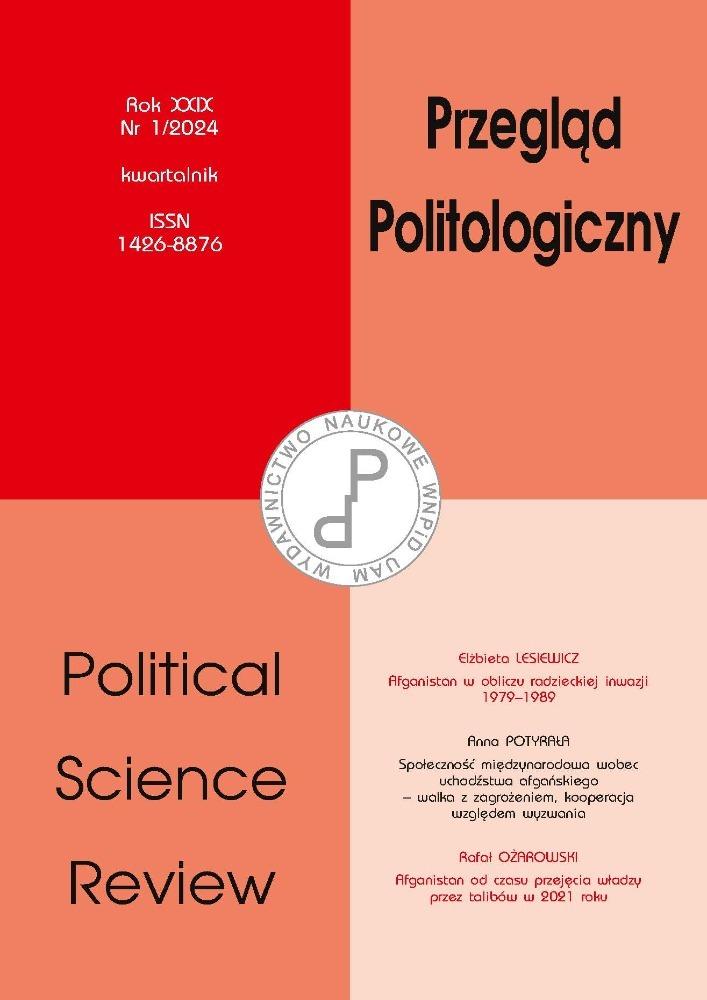Abstract
Afghanistan’s history is an unbroken series of tensions and conflicts that have shaped the region. Afghanistan has been a place of deep internal political instability as a result of its ethno-religious heterogeneity, as well as regional and international geopolitical confrontations within its territories. Prominent among these is the USSR’s invasion of Afghan territory between 1979 and 1989; the following discussion is devoted to this problem, addressing the historical and geopolitical conditions of the conflict. The causes, course and significance of the USSR’s invasion of Afghanistan are analysed. The author concludes that the Soviet invasion of Afghanistan was a complex and multifaceted event influenced by historical, geopolitical and ideological factors. Afghanistan became a battleground in the wider Cold War struggle between the USSR and the US. Soviet intervention was challenged by a range of interrelated forces – local Afghan, regional and international including the US, which funded billions of dollars in aid, weapons and training for the mujahideen, effectively turning the conflict in Afghanistan into a proxy war between the superpowers. The conflict has contributed to the destruction of the country’s infrastructure and increased poverty levels. Moreover, the war in Afghanistan has served as a launching pad for the strengthening of Islamic fundamentalism.
References
A Historical Timeline of Afghanistan, https://www.pbs.org/newshour/politics/asia-jan-june11-timeline-afghanistan, 23.03.2022.
A Turning Point in World History:40 years ago, the Soviet Union invaded Afghanistan, https://www.afghanistan-analysts.org/en/reports/war-and-peace/a-turning-point-in-world-history-40-years-ago-the-soviet-union-invaded-afghanistan/, 4.04.2022.
Afghanistan’s Independence, A Milestone In History, https://tolonews.com/afghanistan/afghanistans-independence-milestone-history, 9.04.2022.
Amad Shah Durrani, w: Encyclopedia Britannica, https://www.britannica.com/biography/Ahmad-Shah-Durrani, 23.03.2022.
Amstutz J. B. (2002), Afghanistan: the first five years of Soviet occupation, University Press of the Pacific.
Aref A. (2023), The ‘Great Game’: Fiction and folly in world empire, https://responsiblestatecraft.org/2023/06/19/the-great-game-fiction-and-folly-in-world-empire/, 24.08.2023.
Braithwaite R. (2012), Afgańcy. Ostatnia wojna imperium, Wydawnictwo Znak Kraków.
Brown A. (2009), The Rise & Fall of Communism, Bodley Head, London, s. 356.
Capezza D. A., Afghanistan: il cimitero degli imperi, https://inchiostro.unipv.it/author/davide-alfonso-capezza/, 8.04.2022.
Cenda-Miedzińska K. (2022), Stanowisko Afganistanu wobec przyjęcia instrumentów międzynarodowej ochrony praw człowieka, cz. II: lata 1973–1989, „Polityka i Społeczeństwo” 4. DOI: https://doi.org/10.15584/polispol.2022.4.3
Czarnota Z., Moszumański Z. (2010), Operacje i działania bojowe radzieckiej 40 Armii w Afganistanie (1979–1989), „Wiedza Obronna”, nr 2, s. 60–91.
Erfan A. H. (2021), The Geopolitical Influential Components in the Afghan Crisis, “Journal of Humanities and Social Sciences Studies”, 3(7), s. 36–43. DOI: https://doi.org/10.32996/jhsss.2021.4.7.5
Feifer G. (2011), Afgańska ruletka. Radziecka inwazja na Afganistan, Wydawnictwo Dolnośląskie.
Fijałkowski T. (2017), Warunki bytowe oraz morale żołnierzy Armii Radzieckiej w Afganistanie (1979–1989). Zarys zagadnienia, Acta Universitatis Lodziensis, Folia Historica 98. DOI: https://doi.org/10.18778/0208-6050.98.12
Forigua-Rojas E., Guerra en Afganistán: la experiencia soviética. The War in Afghanistan: The Soviet Experience, http://www.scielo.org.co/scielo.php?script=sci_arttext&pid=S0122-44092010 000100008, 12.12.2023.
Gady F.-S., 30-Year Anniversary of Soviet Withdrawal From Afghanistan: A Successful Disengagement Operation?, https://thediplomat.com/2019/02/30-year-anniversary-of-soviet-withdrawal-from-afghanistan-a-successful-disengagement-operation/, 2.12.2023.
Ghiasy R., The Evolution of Russian Geopolitical Interests in Afghanistan: From Opportunity to Liability, https://eurasianet.org/the-evolution-of-russian-geopolitical-interests-in-afghanistan-from-opportunity-to-liability, 25.10.2022.
Ghilzai S., Biography of Ahmad Shah Durrani, https://www.afghan-web.com/biographies/biography-of-ahmad-shah-durrani/. 19.06.2022.
Gladstone C. (2001), Afghanistan Revisited, Nova publishers.
Hyman A. (1982), Afghanistan Under Soviet Domination 1964–1981, New York.
Jureńczyk Ł. (2015a), Reakcja administracji Jimmy’ego Cartera na komunistyczny przewrót i wkroczenie wojsk sowieckich do Afganistanu, „Dzieje Najnowsze”, R. XLVII. DOI: https://doi.org/10.12775/DN.2015.3.07
Jureńczyk Ł. (2015b), Relacja amerykańsko-afgańskie w latach 1963–1978, „In Gremium. Studia nad Historią, Kulturą i Polityką”, nr 9.
Kajetanowicz J. (2012), Skutki społeczno-polityczne interwencji ZSRR w Afganistanie, „Zeszyty Naukowe WSOWL”, nr 3.
Kakar H. M. (1997), Afghanistan : the Soviet invasion and the Afghan response, 1979–1982, University of California Press, Berkeley.
Karp Craig M., The War in Afghanistan, https://www.foreignaffairs.com/articles/afghanistan/1986-06-01/war-afghanistan, 21.12/2023.
Kosowski A. (2013), Interwencja ZSRR w Afganistanie, „Res Politicae, Prace Naukowe Akademii im. Jana Długosza w Częstochowie”, t. V.
Kościuszko M. (2013), Wybrane aspekty niepowodzenia radzieckiej interwencji w Afganistanie w latach 1979–1989, „Nasze Historie”, 13.
Kruk T. (2017), Dawid przeciwko Goliatowi. Sowiecka interwencja w Afganistanie (1979–1989), „Studia Orientalne”, nr 1. DOI: https://doi.org/10.15804/so2017104
Mauri P., L’invasione sovietica dell’Afghanistan, https://it.insideover.com/schede/guerra/linvasione-sovietica-dellafghanistan.html, 22.06.2022.
Modrzejewska-Leśniewska J. (2010), Afganistan, Warszawa.
Pashtuns in Afghanistan, https://minorityrights.org/communities/pashtuns/, 22.08.2022.
Past conflicts 1979–2001, https://euaa.europa.eu/country-guidance-afghanistan-2021/621-past-conflicts-1979-2001, 7.07.2022.
Sardar R. (2017), Linkage between the Great October Revolution and the Saur Revolution of Afghanistan and its Effects on Pakistan, “Central Asia Journal”, no. 80, Summer.
Sawant S., The Great Game, https://eduindex.org/2021/07/18/the-great-game/, 22.07.2022.
Sergeev E. (2013), The Great Game, 1856–1907: Russo-British Relations in Central and East Asia, John Hopkins University Press, Baltimore, MD.
Sidos Ph. (1979), l’entrée des Soviétiques en Afghanistan: des hypothèses de planification contraries, https://www.cairn.info/revue-strategique-2016-3-page-55.htm, 23.07.2022. DOI: https://doi.org/10.3917/strat.113.0055
Sierakowsk-Dyndo J. (2002), Afganistan – narodziny republiki, Wydawnictwo Akademickie, Dialog, Warszawa.
Szczepanski K., What Was the Great Game?, https://www.thoughtco.com/what-was-the-great-game-195341, 28.07.2022.
The Geopolitics of Afghanistan, https://thegeopolity.com/2017/09/07/the-geopolitics-of-afghanistan/, 27.11.2022.
The National Security Archive, https://nsarchive2.gwu.edu/NSAEBB/NSAEBB272/Tribute1.htm, 23.11.2022.
The Soviet Invasion of Afghanistan, 1979: Not Trump’s Terrorists, Nor Zbig’s Warm Water Ports, https://nsarchive.gwu.edu/briefing-book/afghanistan-russia-programs/2019-01-29/soviet-invasion-afghanistan-1979-not-trumps-terrorists-nor-zbigs-warm-water-ports, 29.07.2022.
Voje J., Afghanistan: Geopolitical Hospot, https://securityconference.org/en/media/msc-blog/article/afghanistan-geopolitical-hotspot/, 29.07.2022.
License
Copyright (c) 2024 Elżbieta Lesiewicz

This work is licensed under a Creative Commons Attribution-ShareAlike 4.0 International License.

